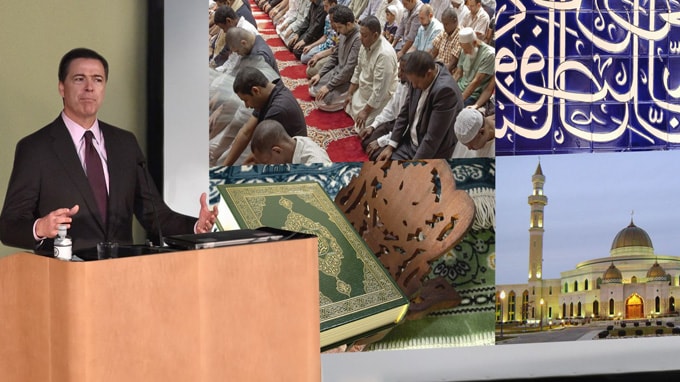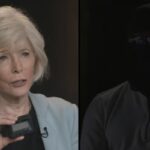WASHINGTON—After 15 years of broadly targeting the 3.3-million-member community and extensively monitoring its activities, the FBI declared an end Friday to its surveillance of Muslim Americans, saying its exhaustive study of their beautiful culture was finally complete.
Officials confirmed that the program was started in the fall of 2001 when federal agents, captivated by Islam’s complex history and rich spiritual traditions, redirected the full force of the bureau’s intelligence-gathering apparatus toward developing a more thoughtful, nuanced appreciation of the Muslim-American way of life.
“We’d always known Islam was one of the great world religions, but it wasn’t until we recruited a network of 15,000 informants and infiltrated mosques all over the country that we came to understand just how magnificent and fascinating it truly is,” said FBI director James B. Comey, who noted that agents gained a valuable and eye-opening understanding of Islam—while also learning a lot about themselves and their own faith in the process—after entering the Muslim places of worship to collect as much information as they could on the intriguing personal beliefs of the religion’s followers. “After analyzing the transcripts of thousands of phone calls and intercepting the communications of prominent Muslim-American leaders and academics, we’ve really come to admire their vibrant culture.”
You may be interested
“The considerable amount of intel we’ve gathered and carefully pored over for the past 15 years has shown us that their faith and customs are really quite inspiring,” Comey added. “If there’s one thing we’ve taken away from all our surveillance, it’s what a glorious and enriching part of our world Islam is.”
According to sources within the bureau, the harvesting of internet data, widespread racial profiling, and the nationwide mapping of Muslim communities have allowed agents to closely observe the followers of Islam on an extremely personal level, thereby allowing them to develop a deep respect for the amazing ethnic and cultural diversity of the faith’s 1.6 billion believers, as well as the striking distinctions between the religion’s various sects, which, they stressed, went far beyond just Sunni and Shiite.
Remarking on all the information they had gathered, FBI officials emphasized that adherents of Islam speak dozens of beautiful languages—Arabic, but also Urdu, Pashto, Farsi, Bengali, Javanese, and many others—and noted that agents came to treasure this linguistic richness after installing recording devices throughout Muslim-American communities and then surreptitiously listening in on Quranic study groups, prayer sessions, and social events.
“Thanks to advances in video surveillance, we’ve been able to look inside Muslims’ homes and view some breathtaking calligraphy prints and handwoven tapestries,” said former agent Casey Hanna, who fondly recalled assignments that allowed him to overhear moving recitations of the Hadith, which he was fascinated to learn come from an oral tradition and are considered to be the direct word of the Prophet Muhammad. “I went undercover in hundreds of Muslim-owned businesses and residences across the nation and was lucky enough to sample many variations on the aromatic stews and delectable desserts that serve as staples of halal cuisine—Arabian, North African, Indonesian. They were all delicious, and unlike anything I’d ever tasted.”
“I’ll never forget this one instance when I closely trailed a New York shop owner for three straight years—his coffee was just spectacular,” Hanna added. “Muslims were the first people to drink coffee, you know.”
After realizing they could not fully nurture their curiosity by limiting their study to Muslims in the United States, the FBI reportedly enlisted the help of the NSA to find out more about the incredible religion. Between 2002 and 2008, the bureau is known to have monitored 7,485 email addresses around the globe in order to learn answers to their many questions about Muslims’ compelling lives and rituals, from why they don’t eat pork, to what Muslim holidays are like, to why some Muslim women wear garments that cover their heads while others don’t.
Comey told reporters the FBI also received information from the CIA, whose enhanced interrogation techniques and clandestine intelligence-gathering methods yielded many interesting revelations from Muslim sources around the world, such as the fact that Arabs make up only 15 percent of the global Muslim population, and that through most of history, women in Islamic societies actually had more property rights than women in the West.
Saying they thoroughly enjoyed studying “such a lovely people and such a lovely faith,” Comey explained that agents would often remove a Muslim citizen from their community and keep them detained for days, weeks, or even months on end to learn everything they could from them about Islam.
“There’s no way I could remember the names of all the Muslim citizens that our agents brought in to discuss the beauty of Islam with one-on-one, but rest assured that with their help, the FBI has gained a deep and illuminating understanding of Islamic culture,” said Comey, who noted that by combing through thousands upon thousands of citizens’ banking records, agents discovered with astonishment how some observant Muslims set up special loan payment plans to avoid paying interest, as they consider it usury, which is forbidden under Sharia law. “It’s crazy to think about, but until little more than a decade ago, I had no idea there were Five Pillars of Islam that guided all Muslims’ spiritual lives. I also didn’t know anything about the multitude of Muslim contributions to mathematics and science that have been absolutely vital to the world. But that’s not to say they don’t value art, though. Poets like Rumi and Hafez drew upon mystical Sufist interpretations of the Quran to write verse that is every bit as sublime as, say, Keats or Coleridge. And don’t even get me started on the architecture.”
“As this program sadly comes to an end, I just want to thank Muslim Americans from the bottom of my heart for teaching us all about your faith and your culture,” he continued. “We’ve learned so much about you over the years. More than you could possibly imagine.”








